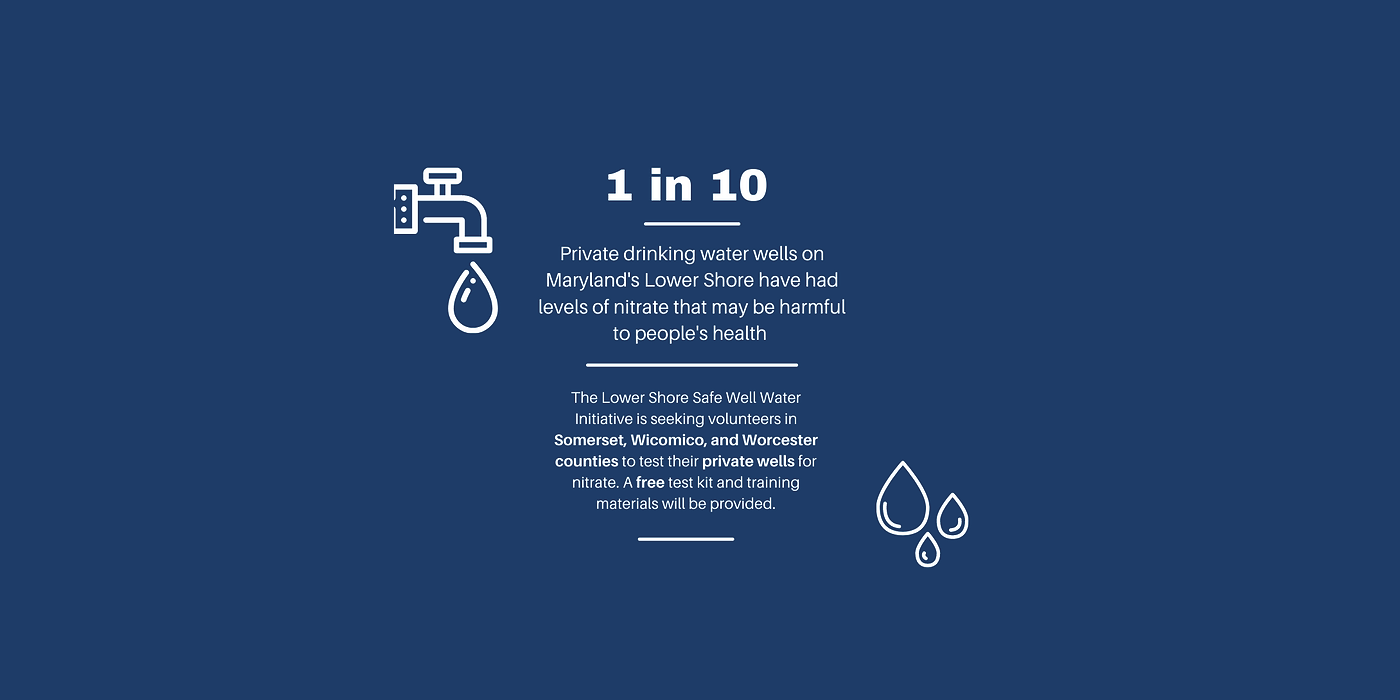
A team of environmental policy advocates, community members and public health scientists, including Rianna Murray, an assistant research professor and Suhana Chattopadhyay, a doctoral student both with the Maryland Institute of Applied Environmental Health, partnered on a project to assess and safeguard drinking water for residents of Maryland's Lower Eastern Shore who rely on private wells. The group, which also includes representatives from The Assateague Coastal Trust, Center for Progressive Reform (CPR), and the Environmental Integrity Project, created the Lower Shore Safe Well Water Initiative to protect public health by engaging residents of Somerset, Wicomico, and Worcester counties in community science focused on evaluating drinking water quality in the region. They found that nearly one-fifth of wells tested had nitrate levels that may be or are hazardous to health.
Many Lower Eastern Shore residents rely on private wells for their household water, but the state of Maryland does not regularly monitor private wells or maintain a public database of well records, leaving many in the dark about the quality of the region's well water. The initiative helps interested residents test their well water for nitrate, a common drinking water contaminant that is colorless, odorless, and tasteless. Nitrate can form when nitrogen from manure, fertilizer, or failing septic systems breaks down. It is an important plant nutrient, but in excess amounts, it can contaminate drinking water and endanger people's health.
Overall, 127 residents tested their private wells for nitrate. Nearly one-fifth of wells had nitrate levels that may be hazardous to health. These results complement a report published by CPR in 2020, which found that four percent of private wells in Wicomico and Worcester counties had nitrate levels above the federal standard of 10 milligrams per liter.
“Our 2020 report assessed well water quality data going as far back as 1965,” said Darya Minovi, a policy analyst at CPR. “These new findings confirm that nitrate contamination is still a problem for Lower Shore residents who rely on private wells.”
In addition to being contacted with their results, all participants were provided with information on how to treat their drinking water. Free follow-up laboratory testing was also offered to all participants with sample results of five milligrams per liter of nitrate or greater. In July 2021, the initiative hosted a well safety training facilitated by the Southeast Rural Community Assistance Project.
"Utilizing a community science approach was important to the study team, as it gave residents of the Lower Eastern Shore ownership over the testing process and empowered residents to learn more about protecting their health through ensuring the safety of their drinking water," said Rianna Murray who served as the project's principal investigator at UMD.
The initiative’s findings illustrate the importance of annual well water testing, but evidence suggests this isn’t happening. In a survey completed by participants prior to testing their wells, few reported testing their wells annually. Meanwhile, nearly a third of participants indicated that they had never tested their wells. In a follow-up survey after testing concluded, more than a third of respondents said that the cost of testing and remediation was a barrier to regular testing.
"Private wells in Maryland are only required to be tested and recorded at the time they are drilled, regardless of how long the well has been in use or whether there may be new sources of potential contamination," explained Dr. Murray.
"This lack of information and oversight of private wells is largely due to the fact that the Safe Drinking Water Act, the federal law governing the health of the nation’s drinking water, does not extend its protections to private drinking water wells."
Del. Vaughn Stewart (D-Montgomery) has introduced a bill this year that would address barriers to testing. If passed, House Bill 250 will create a Private Well Safety Program in Maryland. The program will provide eligible residents with financial assistance to cover the costs associated with water test kits and well remediation if unsafe levels of contamination are detected. The bill will also require Maryland’s Department of the Environment (MDE) to create a public online database of well water quality test results and require water quality testing during the sale of a home with a well.
“There is almost no public information regarding private wells for Lower Shore counties. This is detrimental to the residents who are trying to find information about water quality in their communities,” said Assateague Coastkeeper Gabby Ross.
“This bill would provide the critical assistance needed to support residents in areas where well water is unsafe and heighten the need for more testing and more public information.”
About the Center for Progressive Reform
The Center for Progressive Reform harnesses the power of law and public policy to create a responsive government, a healthy environment and a just society.
About the Environmental Integrity Project
The Environmental Integrity Project is a nonprofit organization, based in Washington, D.C. and Austin, Texas, that is dedicated to enforcing environmental laws and strengthening policy to protect human health and the environment.
About the Assateague Coastal Trust
Assateague Coastal Trust, a member of the global Waterkeeper Alliance movement, hosts the Assateague COASTKEEPER, working to assure our communities have access to swimmable, fishable and drinkable water. For over 50 years ACT has been working arm in arm with diverse community partners to protect and defend the health of Delmarva’s coastal waters through advocacy, education, science and the enforcement of just and equitable clean water laws.